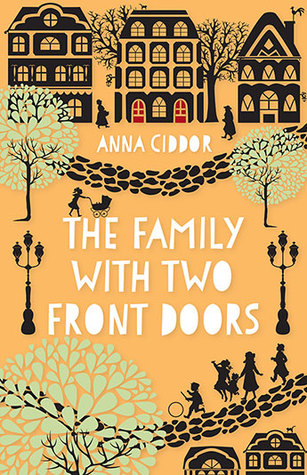 Ciddor, Anna. The Family with Two Front Doors
Ciddor, Anna. The Family with Two Front DoorsJanuary 1st 2018 by Kar-Ben Publishing
Public Library Copy
In the 1920s, the Rabinowitz family has nine children, so they ned two apartments, hence the two front doors of the title. The father is a rabbi, and the family is very involved in their small town, Lublin, in Poland. When the oldest daughter, Adina, reaches the age of 15, the family arranges for her to marry a man from Warsaw. There are lots and lots of preparations for a wedding, including meeting the family (but not the groom!), planning parties, cleaning, and doing lots and lots of cooking. Even ten-year-old Nomi (based on the author's nana) is pressed into cooking, and makes a gefilte fish so good that her father assumes that Adina made it. There are some problems along the way (the challah gets knocked to the ground while being picked up to take to the oven, the groom might want to take Adina to Warsaw), but in general the family gets along very well, enjoys being together, and the wedding is a success.
Strengths: This definitely had a vibe similar to Taylor's All-of-a-Kind Family, with lots of details about daily life in a Jewish household. There are differences, of course, since this is set in Poland in the 1920s. So many of the details would be eye opening to today's children-- baths once a week in a portable tub? Not being allowed to use power on the Sabbath? Arranged marriages? The author has done a good job fictionalizing her family history, and it's nice to read a story with Jewish characters that is NOT about the Holocaust. There is, however, a sad note about the fate of the family during World War II.
Weaknesses: This had an old fashioned air and read like the books of my childhood. Nothing exciting, just interesting details. This is not a style my students are wild about.
What I really think: I really want to buy this one, but I've spent years trying to get students to read Sydney Taylor to no avail, so I may have to pass!

I have read this book (Australian author) and I believe it’s doing very well here - well enough to have given it a US edition, and I believe it has been translated as well. My mother was a Jewish child in 1930s Poland and remembers doing a lot of the things Nomi does, including dropping off and picking up chulent and challah. She says the book takes her right back... Unless your library budget is as tiny as mine was, perhaps you might consider getting just one copy? Of course, you know your kids best! 🙂
ReplyDelete